General Information
Media & Press Releases
Press Releases
The following media advisory and press releases were prepared by the United Nations Department of Public Information in conjunction with the Department of Economic and Social Affairs for the 6th Global Forum on Reinventing Government.
Media Advisory Distributed 12 May 2005
6th Global Forum Press Release Distributed 18 May
Opening Ceremonies Press Release Distributed 24 May
Innovations & Local Governance Release Distributed 25 May
Closing Ceremonies Press Release Distributed 27 May
Media Coverage
For convenience, media coverage has been grouped into four categories: General Interest, Technology & Innovation, the Seoul Declaration on Participatory and Transparent Governance, and the United Nations Governance Centre.
General Interest
International articles on the 6th Global Forum, speakers, events, and national reform efforts to increase participatory and transparent governance.
Innovation & Technology
Selected media coverage on the role and impact of technology and e-government on governance.
Seoul Declaration
Articles on the declaration and its contents.
UN Governance Centre - www.ungc.org
Articles on the establishment of a regional policy, research, and training centre in Seoul.
Speeches
OPENING CEREMONIES
The following officials spoke at the opening ceremonies of the 6th Global Forum on Reinventing Government on 24 May 2005
President Roh Moo-hyun
Republic of Korea
President Lula Da Silva
Brazil
President Emomali Rahmonov
Republic of Tajikistan
Prime Minister Lee Hae-chan
Republic of Korea
Prime Minister Thaksin Shinawatra
Thailand
Vice President Hamid Reza Baradaran Shoraka
Islamic Republic of Iran
Vice President Ali Mohamed Shein
Tanzania
Under-Secretary-General José Antonio Ocampo
United Nations Department of Economic and Social Affairs (UNDESA)
Secretary-General Donald Johnston
Organisation for Economic Co-operation and Development (OECD)
CLOSING CEREMONIES
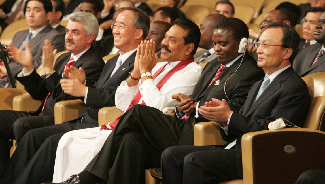
The following officials spoke at the closing ceremonies of the 6th Global Forum on Reinventing Government on 27 May 2005:
Prime Minister Lee Hae-chan
Republic of Korea
Prime Minister Mahinda Rajapakse
Sri Lanka
Vice President Azarias Ruberwa Manywa
Democratic Republic of the Congo
Director Guido Bertucci
United Nations Department of Economic & Social Affairs, Division for Public Administration & Development Management
Minister Oh Young-kyo
Republic of Korea, Ministry of Government Administration & Home Affairs
Brochures
6th Global Forum Brochure
Available in English, Spanish, and French, this brochure contains messages from the United Nations Secretary General and the Prime Minister of the Republic of Korea.
French | English | Spanish
International Innovation Exhibition
As part of the 6th Global Forum, the exhibition featured displays of innovative practices from around the world that improve public administration and service delivery.
The Exhibition Brochure The exhibition introduced benchmark applications from different countries designed to improve transparency, participation, and access to services.
International Innovation Exhibitors Over one hundred exhibitors from six continents showcased projects designed to improve service provision, environmental protection, urban management, and e-government.
World Public Sector Report 2005 Brochure
A flagship publication of DPADM/UNDESA, this biennial report provides policy makers and civil society with research and information on emerging public sector issues.
Regional Forums
Six regional forums were organized in preparation for the 6th Global Forum on Reinventing Government. The key conclusions and results from each forum were presented to participants during the Wrap-Up Session.
Latin America
Arab States
Workshops
As part of the 6th Global Forum, participants were invited to attend one of nine parallel capacity building workshops on May 26 and 27, 2005. Each workshop was chosen for its relationship to the issues of participatory and transparent governance and gathered international decision-makers and top policy experts to elaborate upon key themes discussed in the plenary sessions.
Workshop I: Public Sector Ethics and Trust in Government (UNDESA, OECD, TI)
May 26 & 27, 2005
As part of a collaborative effort, the United Nations Department of Economic and Social Affairs (UNDESA), the Organisation for Economic Cooperation and Development (OECD), and Transparency International (TI) will offer a capacity building workshop on Public Sector Ethics and Trust in Government.
This workshop will provide an update on new global and regional trends within the field of public sector ethics and anti-corruption efforts, highlighting relevant provisions in the UN Convention Against Corruption and other global agreements and reports. It will also place special emphasis on good practices in the management of national and sub-national ethics infrastructures. Political and technical challenges in introducing or strengthening the common elements of a national integrity system will be shared, taking into account the need for integrity, transparency, and accountability in public sector service delivery. Intended for both generalists and specialists with an interest in this topic, Public Sector Ethics and Trust in Government will provide tool sets on codes of conduct, conflicts of interest, civic education, assessment frameworks, and the promotion of ethical decision-making in practical situations. Region and sector specific challenges will also receive attention, offering participants the opportunity to discuss their diverse experiences.
Workshop II: Governance-Oriented Innovations to Enhance State Capacity
(UNDESA, UNDP, and the Ash Institute of Harvard University)
As part of a collaborative effort, the United Nations Department of Economic and Social Affairs (UNDESA), the United Nations Development Programme (UNDP), and the Ash Institute of Harvard University will offer a capacity building workshop on Governance-Oriented Innovations to Enhance State Capacity.
As a result of globalization, the context for most governments has been transformed so radically that their traditional structures and modes of operation are no longer relevant. Flexible structures and processes are increasingly favored over the more traditional and bureaucratic patterns. There are also growing demands to make the state more competent, cohesive, and connected to the citizenry. Moreover, the Millennium Development Goals (MDGs) are not likely to be realized without significant investment in the strengthening of public administration capacities at national and local levels. Governance-Oriented Innovations to Enhance State Capacity will bring together senior decision makers and civil servants, policy advisers, local government officials, and others involved in public sector strengthening to discuss new approaches, tools, and methodologies aimed at improving the capacity of governments to: formulate and coordinate policy-making, develop the human capital, reform structures and functions, deliver services more responsively and transparently, foster the participation of civil society through partnerships, and exercise leadership in public sector transformation.
Workshop III: Access to Services for All through Participation and Accountability
(UNHABITAT, KIPA, MOGAHA)
As part of a collaborative effort, the United Nations Human Settlements Programme (UNHABITAT), the Korea Institute of Public Administration (KIPA), and the Ministry of Government Administration and Home Affairs of Korea (MOGAHA) are pleased to present a capacity building workshop on Access to Services for All through Participation and Accountability.
The purpose of the workshop is to provide good governance strategies for improving the provision of basic services to the poor and under represented groups through creative measures which encourage transparency and increased participation. Innovative partnership models and incentive structures for encouraging the involvement of community organizations, NGOs, and the private sector will be presented with an emphasis on placing underserved populations at the center of governance. Issues associated with urban centers and particularly slum upgrading will also receive attention during this workshop, which will share experiences of best practices and leadership case studies with a view to meeting the Millennium Development Goals.
Workshop IV: E-Government as a Tool for Participation and Transparency
(UNDESA, IIAS, NCA, MOGAHA)
As part of a collaborative effort, the United Nations Department of Economic and Social Affairs (UNDESA), the International Institute of Administrative Sciences (IIAS), the National Computerization Agency (NCA), and the Ministry of Government Administration and Home Affairs of Korea (MOGAHA) will offer a capacity building workshop on E-Government as a Tool for Participation and Transparency.
This workshop will discuss the pivotal role of e-government in the global community's transition to a Knowledge Society through its potential for optimizing service delivery, increasing transparency, encouraging the increased participation of constituencies, and strengthening people-centered governance. Topics will include the practical applications of e-government systems, discussion of the contexts in which the deployment of e-government is most effective, and an explanation of results of the 2003 and 2004 UN Global E-Government Surveys. As a positive example of some of the issues associated with the implementation of an e-government system, the workshop will also present the case of the Republic of Korea's Open System, which allows the on-line submission, processing, and review of civil applications. By encouraging increased efficiency and accountability, the Open System aims to minimize deviation from acceptable procedural norms for the end result of increasing trust in government and its processes. Following each presentation, participants will be invited to comment on their own experiences in general discussion.
Workshop V: Auditing for Social Change
(UNDESA, BAI, KAPA)
As part of a collaborative effort, the United Nations Department of Economic and Social Affairs (UNDESA), the Board of Audit and Inspection of the Republic of Korea (BAI), and the Korean Association for Public Administration (KAPA) are pleased to present a capacity building workshop on Auditing for Social Change.
The auditing community has historically operated within a tightly circumscribed field, limited in scope and by national boundaries. However, globalization has expanded both the reach and the influence of the audit, bringing it to the forefront of the operational framework of governance. The workshop on Auditing for Social Change will address the challenges and opportunities of this increasingly relevant topic, fostering a greater awareness of the critical role of the audit in promoting participatory and transparent governance, as well as its increasing contribution to government policy-making and processes, particularly through its relationship with planning and budgeting. Presentations will include the role of Supreme Audit Institutions, issues of citizen participation and empowerment, and relationships with legislative oversight bodies and the media. Innovative ways of engaging the auditing community more pro-actively will be discussed to ensure that impact is achieved for the public good, not only as a result of audit recommendations, but also as a result of the processes involved, such as risk-assessment and results based methodology. Special attention will additionally be given to the audit's ability to push the social agenda and facilitate the achievement of the Millennium Development Goals.
Workshop VI: Representative Democracy, Participatory Methods, and Capacity Development for Responsible Politics
(International IDEA)
As part of the 6th Global Forum, the International Institute for Democracy and Electoral Assistance (IDEA) is pleased to offer a capacity building workshop on Representative Democracy, Participatory Methods, and Capacity Development for Responsible Politics.
Despite significant progress made during the last decade, both new and mature democracies face diverse and growing challenges in their efforts to make democracy work. Among these are dilemmas presented by competing democratic values, the design and capacity of political institutions, the emergence of new information technologies, and issues such as poverty, security, terrorism, and HIV/AIDS. Responsible Politics will focus on the need to strengthen political processes and democratic institutions to enhance their responsiveness and capacity to meet popular expectations. The workshop will discuss the concepts of representation, participation, and capacity development in relation to current challenges by examining the themes of electoral systems design, direct democracy, political party systems, and the extent to which they promote or impede responsible politics. Following discussions of best practices, participants will receive ample opportunity to share their experiences on these and related subjects.
Workshop VII: Corporate Governance, Market Economy, and Accountability
(KDI School, World Bank)
As part of a collaborative effort, the KDI School of Public Policy and Management and the World Bank are pleased to present a capacity building workshop on Corporate Governance, Market Economy, and Accountability.
In recent years, the use of government regulation alone has become insufficient when not accompanied by broad based systems of accountability built into the governance structures of corporations themselves. Recognizing the heightened need for improved corporate governance, this workshop was designed to address alternative experiences from traditional, emerging, and full market economies. Corporate Governance, Market Economy, and Accountability will discuss topics associated with the concentration of economic power, ownership of banks and state owned enterprises, board of directors and executive compensation, institutional shareholder activism, enforcement, social responsibility, and corporate ethics. As one of several case studies, the workshop will closely examine the progress achieved by the Republic of Korea, which introduced an extensive set of reform measures in the late 1990s. Participants will be invited to share their own experiences at this workshop, which will approach the topic of corporate governance from different perspectives.
Workshop VIII: Decentralization and Local Autonomy for Participatory Democracy
(Ministry of Public Administration of Italy, KRILA, Formez, MOGAHA)
As part of a collaborative effort, the Ministry of Public Administration of Italy, the Korea Research Institute for Local Administration (KRILA), the Formez Study and Training Center of Italy, and the Ministry of Government Administration and Home Affairs of Korea (MOGAHA) are pleased to present a capacity building workshop on Decentralization and Local Autonomy for Participatory Democracy.
Decentralization processes unfolding across the globe each have the potential to encourage greater participatory governance, bringing decision making within closer reach of local populations. However, the transfer of authority and resources which accompany these processes often varies considerably, depending on the approach that is employed. This workshop will examine some of the practical considerations that produce decentralization efforts, beginning with a framework discussion to clarify the different forms of decentralization in relationship to issues of inclusiveness and local accountability. A presentation of regional trends and policy implications will advance the workshop, which will include case studies on successful methods of strengthening administrative effectiveness, democratization, political participation, and local development policies. Supplementary issues related to the importance of achieving good coordination between governmental authorities will also be addressed in this workshop, which will encourage participants to present their own experiences with regard to implementation issues and alternative ways of addressing them.
Workshop IX: The Role of Civil Society Organisations in Localising the Millennium Development Goals
(UNDP, UNICEF, and CIVICUS)
As part of a collaborative effort, the United Nations Development Programme (UNDP), the United Nations Children's Fund (UNICEF), and the World Alliance for Citizen Participation (CIVICUS) are pleased to present a capacity building workshop on the Role of Civil Society Organisations in Localising the Millenium Development Goals.
Through the exploration of innovative cultural and participatory approaches, this workshop will introduce alternative ways for civil society to achieve concrete and attainable results at the local and sub-national levels. Efforts to combat challenging issues, such as extreme poverty or hunger, are often limited to the national and international arenas by the belief that significant progress can only occur at these levels. The Role of Civil Society Organisations in Localising the MDGs seeks to change that perception by presenting positive experiences from developing regions around the globe that illustrate the ability of civil society organizations and partnerships to empower themselves and answer the question: "What can we do here at the local level?" The workshop will identify key tools, strategies, policies, and techniques that account for the role of cultural values, strengthening accountability and transparency mechanisms to enable effective local development and governance. Government officials, members of the donor community, NGO and CBO representatives, the private sector, media, and academics are strongly encouraged to attend this participatory workshop, which promises to be both colorful and highly instructive.
Background Papers
Government Innovation and State Capacity
From Public Administration to Governance: The Paradigm Shift in the Link between Government and Citizens
G. Shabbir Cheema, UNDESA
Government Innovations for Participation and Transparency
Gowher Rizvi, the Ash Institute for Democratic Governance and Innovation
Global Economy, Accountable Governance, and Administrative Reform
Sabino Cassese and Mario Savino, University of Rome
E-Government
E-Government: Providing Value to Citizens
Jerzy Szeremeta and Richard Kerby, United Nations Department of Economic and Social Affairs
Promoting Citizen Participation in E-Government
Sam Young So, National Computerization Agency
Accountability and Transparency
Dimensions of Transparency in Governance
Jeremy Pope, the Governance Access Learning Network
Access to Services
Pro-Poor Governance for Delivery of Basic Services
United Nations Human Settlements Programme
Democratic Governance and Participation
Representative Democracy and Capacity Development for Responsible Politics
Massimo Tommasoli, International Institute for Democracy and Electoral Assistance
Principles of Electoral System Choice
Andrew Ellis, International Institute for Democracy and Electoral Assistance
Removal of Congresspersons from Public Office
Fernando Cepeda Ulloa
Party, Party Systems, and Democratisation
Anna Maria Gentili, University of Bologna
Decentralization and Local Government
Decentralization and Local Autonomy for Participatory Democracy
James Katorobo, Makerere Institute of Social Research
Alternative Regional Development Based on Decentralization and Innovation
Kim Hyung Kee, Kyungpook National University
Corporate Governance
Corporate Governance in Developing, Transition, and Emerging Market Economies
Charles Oman, Steven Fries, and Willem Buiter, OECD Development Centre
Market Economy and Corporate Governance: Fairness and Transparency for Sustainable Growth
Kang Chul Kyu, Korea Fair Trade Commission
Civil Society and Participatory Governance
Role of Civil Society Organizations in Governance
Aisha Ghaus-Pasha, Centre for Social Policy
Partnerships and the Millenium Development Goals
Olympios Katsiaouni, United Nations Department of Economic and Social Development
Reflexive Consensus System: A New Governance Model
Sang Jun Kim, The Graduate School of NGO Studies, Kyung Hee University
Auditing for Social Change
Audit & The Millennium Development Goals
Esther Stern, UNDESA
The Role of Civil Society Organizations in Auditing & Public Finance Management
Vivek Ramkumar and Warren Alan Krafchik, Int Budget Project
Audit & Legislative Oversight
Vinod Sahgal of the South Asia Regional Financial Management Team with the World Bank Institute
Audit & Civil Society
Samuel Paul, Public Affairs Center
Media & Audit: Strengthening People's Right to Public Resource Management
Mahfuz Anam, Daily Star
World Public Sector Report
World Public Sector Report
Unlocking the Human Potential for Public Sector Performance
Side Meetings
Ministerial Round Table on Innovation
This highly acclaimed meeting serves as an important venue for ministers to share their visions on government reinvention. On Wednesday, 25 May 2005, the Ministerial Round Table on Innovation was held as part of the 6th Global Forum on Reinventing Government in the COEX Grand Ballroom. Attended by delegates of over 80 countries, its participants included the Minister for Public Administration of Italy; the Minister for the Civil Service, Social Integration, Urban Policy, and Equal Opportunity of Belgium; the Prime Minister's Adviser on Public Service Reform of the United Kingdom; the Director of ENA in France; the Chairman of the National Reconstruction Bureau of Pakistan; the Minister for Home Affairs of Vietnam; the Minister of the Secretariat General for the Presidency of Chile; the Secretariat of the Presidency for the Innovation of Government in Panama; the Minister for Public Service and Administration in South Africa, and many others.
Presentations on "Government Reinvention for Attaining Good Governance" by ministers and delegates
- Afghanistan
- Bulgaria
- Cambodia
- Dominican Republic
- England
- Finland
- Greece
- Honduras
- Indonesia
- Mexico
- Mozambique
- New Zealand
- Qatar
- Republic of Korea
- Romania
- Singapore
- Timor-Leste
Gubernatorial and Mayoral Round Table
As the largest meeting of local government leaders ever held under the auspices of the Global Forum, this meeting enabled mayors and governors to discuss current issues in local administration, share model cases of innovation, and enhance mutual cooperation.
The Gubernatorial and Mayoral Round Table was the largest meeting of local government leaders ever held under the auspices of the Global Forum. Topics included the changing roles of mayors and governors, how to generate innovations in public administration at the local level to improve governance, and means of enhancing mutual cooperation. Representatives of 27 countries attended the meeting on 25 May 2005, as well as the heads of 266 provincial and municipal governments.
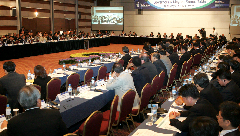
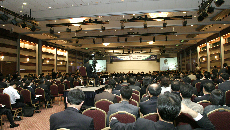
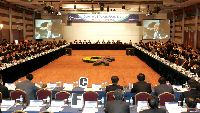
Participants included 39 regional governments from China, 14 regional governments from Japan, six regional governments from Vietnam, four regional governments each from Brazil and Mongolia, three regional governments from India, two regional governments each from the US and Canada, and local governments from 18 additional countries, which included Egypt, England, France, Indonesia, Italy, Nigeria, Oman, Paraguay, Peru, Poland, Sri Lanka, and Turkey.

Several side events accompanied the plenary sessions and workshops as part of the 6th Global Forum. These included the International Innovation Exhibition, the Ministerial Round Table on Innovation, the Gubernatorial and Mayoral Round Table, and the ASEAN+3 Ministerial Meeting on Creative Management for Government. For more information on these activities, please select from the following links:
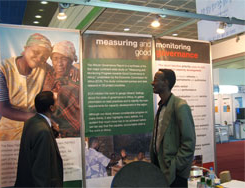

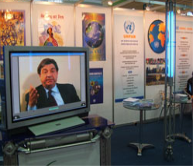

International Innovation Exhibition 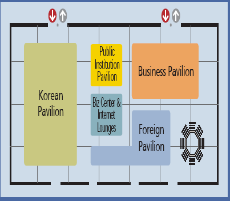
As part of the 6th Global Forum, the exhibition featured displays of innovative practices from around the world that improve public administration and service delivery.
The International Innovation Exhibition (IIE) featured hundreds of displays from around the world designed to improve service delivery and public administration. As part of the 6th Global Forum on Reinventing Government, the side event received several thousand international and local visitors between 24 and 27 May 2005. Exhibitors included United Nations Public Service Award winners, central and local governments, non governmental organisations, and the private sector.
The Exhibition Brochure
The exhibition introduced benchmark applications from different countries designed to improve transparency, participation, and access to services.
International Innovation Exhibitors
Over one hundred exhibitors from six continents showcased projects designed to improve service provision, environmental protection, urban management, and e-government.
 Welcome to the United Nations
Welcome to the United Nations